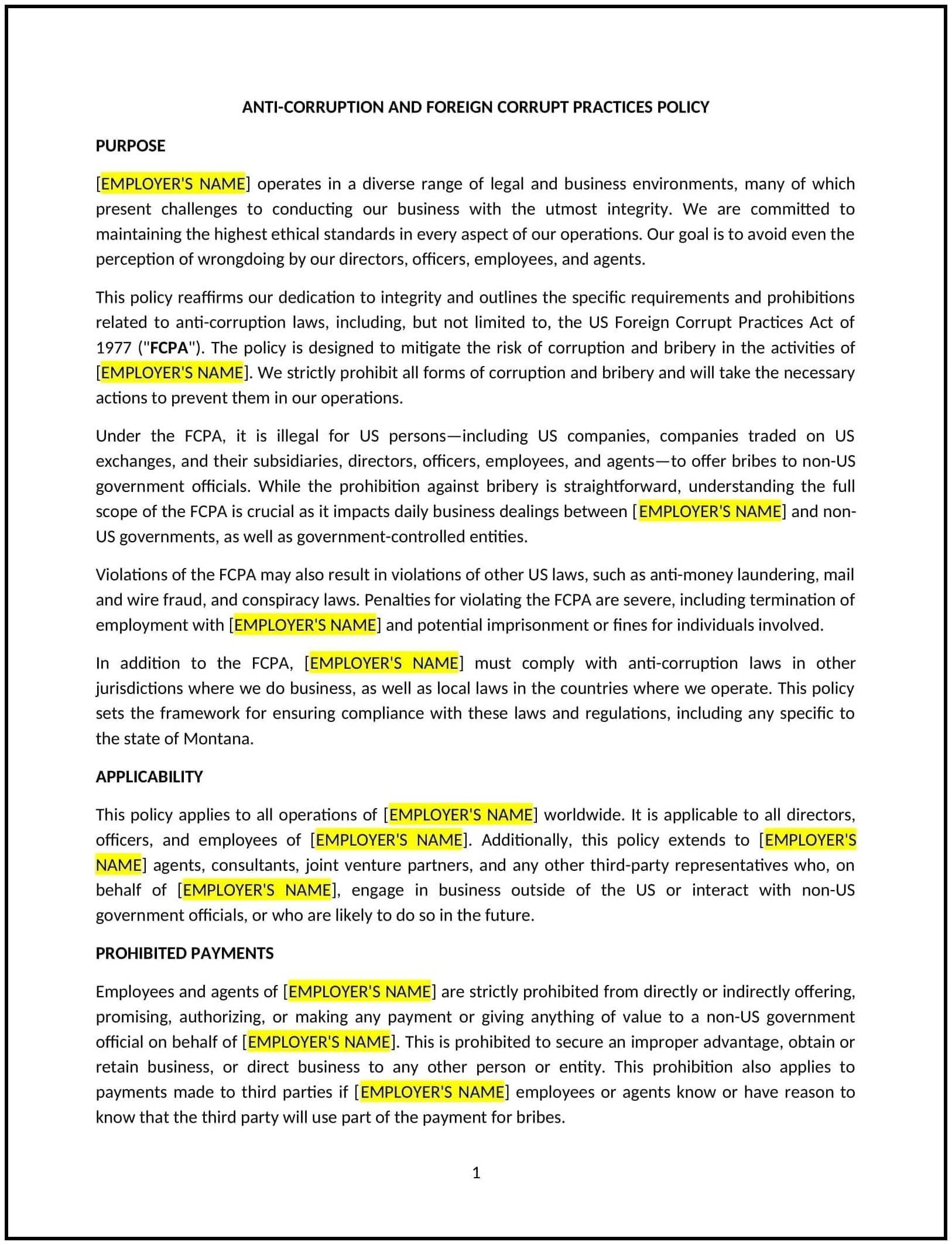Anti-corruption and foreign corrupt practices policy (Montana): Free template
Got contracts to review? While you're here for policies, let Cobrief make contract review effortless—start your free review now.

Customize this template for free
Anti-corruption and foreign corrupt practices policy (Montana)
An anti-corruption and foreign corrupt practices policy helps Montana businesses establish clear guidelines for preventing bribery, corruption, and unethical business conduct. This policy sets expectations for employees, third parties, and business partners regarding ethical behavior and compliance with relevant state and federal laws, such as the Foreign Corrupt Practices Act (FCPA).
By implementing this policy, businesses can reduce legal and reputational risks, promote ethical decision-making, and maintain transparency in financial and operational activities.
How to use this anti-corruption and foreign corrupt practices policy (Montana)
- Define corruption and prohibited activities: Businesses should outline what constitutes bribery, kickbacks, and other corrupt practices. The policy should specify prohibited actions, including offering, receiving, or requesting anything of value to influence business decisions.
- Establish expectations for employees and third parties: The policy should apply to employees, contractors, and business partners. Businesses should communicate that all parties must follow ethical business practices and avoid conflicts of interest.
- Outline record-keeping and reporting requirements: Businesses should require accurate financial record-keeping and transparent reporting to prevent fraudulent activities. Proper documentation should support all transactions to demonstrate business integrity.
- Provide guidance on gifts and hospitality: Businesses should define acceptable limits for giving and receiving gifts, meals, or entertainment to prevent undue influence. The policy should include clear thresholds and approval procedures.
- Set up reporting mechanisms: Businesses should establish confidential channels for employees to report suspected corruption, such as a whistleblower hotline or direct reporting to compliance officers.
- Define consequences for violations: The policy should specify disciplinary actions for employees or third parties who violate anti-corruption rules, including potential termination or legal action.
- Review and update regularly: Businesses should periodically assess the policy to align with evolving legal requirements and industry best practices.
Benefits of using this anti-corruption and foreign corrupt practices policy (Montana)
This policy provides several key benefits for Montana businesses:
- Reduces legal and financial risks: A clear policy helps businesses prevent legal issues related to corruption and financial misconduct.
- Promotes ethical business practices: Establishing clear guidelines reinforces a culture of honesty, integrity, and responsible decision-making.
- Strengthens business reputation: Businesses that actively prevent corruption build trust with customers, investors, and regulatory agencies.
- Protects against fraudulent activities: Transparent record-keeping and oversight help detect and prevent fraud before it affects business operations.
- Encourages accountability: Defining prohibited actions ensures employees and business partners understand their responsibilities and consequences for misconduct.
- Supports compliance with federal and state regulations: A structured policy helps businesses navigate legal obligations while maintaining ethical standards.
Tips for using this anti-corruption and foreign corrupt practices policy (Montana)
- Communicate the policy clearly: Businesses should ensure all employees, contractors, and third parties understand anti-corruption expectations.
- Provide regular training: Employees should receive periodic training on identifying and avoiding corrupt practices, including real-world scenarios.
- Maintain accurate records: Businesses should require detailed documentation of all financial transactions, vendor relationships, and contract negotiations.
- Enforce compliance consistently: Violations should be addressed uniformly across all levels of the organization to uphold ethical standards.
- Encourage anonymous reporting: Businesses should provide secure and confidential reporting options to protect whistleblowers from retaliation.
- Monitor policy effectiveness: Businesses should periodically audit compliance efforts and adjust policies based on identified risks.